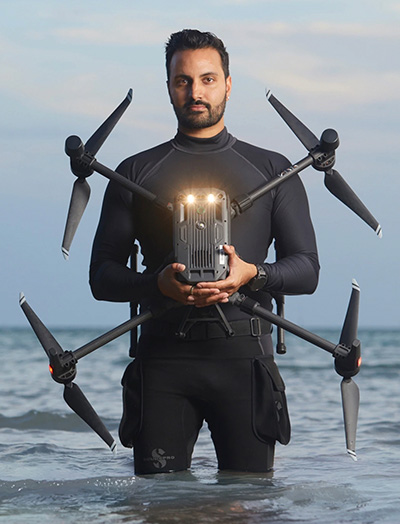
Ved Chirayath, Ph.D.
Vetlesen Endowed Chair of Earth Sciences, Department of Ocean Science
Department of Mechanical & Aerospace Engineering, Secondary Appointment
Director, Aircraft Center for Earth Studies (ACES)
Ved Chirayath is the G. Unger Vetlesen Professor of Earth Sciences and Director of the Aircraft Center for Earth Studies (ACES) at the University of Miami's Rosenstiel School. Chirayath's research focuses on inventing, developing, and testing next-generation sensing technologies for studying the natural world. Ulitmately, his aim is to extend our capabilities for studying and protecting life on Earth as well as to aid in the search for life elsewhere in the universe. Professor Chirayath leads a multi-disciplinary team developing new instrumentation for underwater, airborne, and spaceborne remote sensing and communications. He validates instrumentation through scientific field campaigns around the world, often in extreme environments that serve as analogs for planetary science and ocean worlds applications. Chirayath works to ensure our innovations, developed for exploration and discovery, are broadly available to the public. His team also develops machine learning algorithms to process big data on supercomputing facilites. Chirayath is the inventor of FluidCam, fluid lensing, MiDAR, NeMO-Net, and a plasma-actuated drone.
Professor Chirayath grew up in Southern California with a passion for NASA's mission and space exploration. In 2003, a sophomore in high school, he modified a consumer digital camera and telescope to successfully detect an extra-solar planet, 150 light years away roughly twice the size of Jupiter. Since then, his research interests have relied on the intersection of multiple disciplines including aeronautics, astrophysics, earth sciences, engineering, and optics. Formerly, Chirayath directed the NASA Laboratory for Advanced Sensing (LAS) as a tenured civil servant at NASA Ames Research Center in Silicon Valley, CA for ten years.
In 2021, Chirayath was one of 30 finalists of 12,000 applicants for the NASA Astronaut Candidate Class of 2021. In 2020, Chirayath received the AGU Falkenberg Award for "contributions to the quality of life, economic opportunities, and stewardship of the planet through the use of Earth science information and to the public awareness of the importance of understanding our planet." In 2019, Chirayath's MiDAR invention was awarded a NASA Invention of the Year, chosen from among thousands of new technologies within the agency, for its novelty and potential broad applications to advancing the state-of-the-art in sensing. In 2017, Chirayath received the NASA Early Career Award in recognition of “significant advances in aquatic remote sensing technology."




